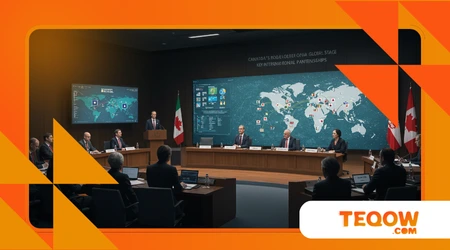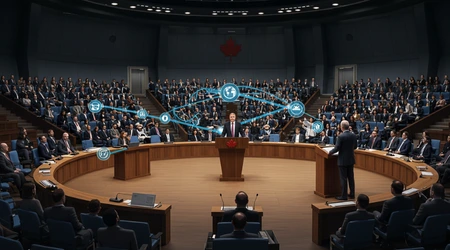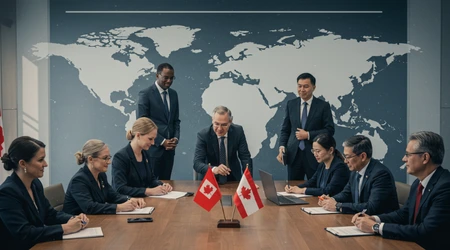Canada’s Role on the Global Stage: Key International Partnerships

For a country known for its diplomacy, Canada’s Role on the Global Stage has never been more critical. In a world defined by geopolitical shifts, Canada is leveraging its key alliances. It is using these relationships to champion multilateralism.
Canada is a strong advocate for a rules-based international order. This stance defines Canada’s Role on the Global Stage. It relies on cooperation and mutual respect. This is a core tenet of its foreign policy.
The nation’s reputation is built on peacekeeping and mediation. This is how it has traditionally defined its influence. Today, its partnerships extend into trade, technology, and security.
These partnerships are not just about politics. They are about shared values. They are about human rights, democracy, and environmental protection. These principles guide Canada’s Role on the Global Stage.
The nation is actively engaged in many international forums. This includes the G7, G20, and the United Nations. Canada uses these platforms to promote its interests and values.
This proactive approach is a modern evolution of its foreign policy. It shows that the country is not just a follower. It is a leader. This is the new reality of Canada’s Role on the Global Stage.
Key Alliances in a Changing World
Canada’s most significant relationships are with its closest allies. The partnership with the United States is a prime example. This relationship is complex and multifaceted. It includes trade, defense, and cultural ties.
The U.S. is Canada’s largest trading partner. The North American Free Trade Agreement (NAFTA), now the Canada-United States-Mexico Agreement (CUSMA), governs this relationship. This trade deal is a crucial pillar of Canada’s Role on the Global Stage.
Canada also has a deep historical and security partnership with the United Kingdom. This relationship is part of the Commonwealth. It has fostered long-standing cooperation. This includes intelligence sharing and military training.
++ The Future of Work in Canada: Remote, Hybrid, or Back to Office?
Another vital alliance is with the European Union. Canada and the EU share many values. They are working together on climate change and trade. The CETA trade agreement has boosted economic ties.
The country’s role is not just about its neighbors. It is also about its partners in the Indo-Pacific region. This is a strategic priority for Canada’s Role on the Global Stage. Canada is increasing its engagement here.
The relationships with Japan and South Korea are becoming more important. These partnerships focus on technology, innovation, and supply chain resilience. This shows how Canada is diversifying its foreign policy.

Championing Multilateralism and Human Rights
Canada has a long history of supporting multilateral institutions. It believes that global problems require global solutions. This commitment defines its foreign policy.
The country is a strong supporter of the United Nations. It contributes troops to peacekeeping missions. It is also a significant donor to humanitarian aid. This is a core part of its identity.
Canada has often acted as a mediator in global conflicts. It promotes diplomacy over confrontation. This approach has earned it respect. It is a soft power strategy.
Also read: Latest Updates on Immigration Policies in Canada
The nation has also taken a strong stance on human rights. It has been a vocal critic of abuses in other countries. It uses its position to advocate for vulnerable populations.
For example, Canada has hosted refugees from around the world. It provides a safe haven for those fleeing conflict and persecution. This is a clear demonstration of its values.
Canada’s commitment to multilateralism is unwavering. It sees these institutions as a way to promote stability. This is a key part of Canada’s Role on the Global Stage.
Economic Diplomacy and Trade
Canada’s economic partnerships are crucial to its prosperity. The country has a trade-based economy. It relies on open markets and fair rules. This shapes its approach to international relations.
The Indo-Pacific Strategy is a prime example. Canada is seeking to diversify its trade relationships. It wants to reduce its reliance on a single market. This is a smart move.
This strategy includes new trade agreements. It also involves increased investment in the region. This is a proactive effort to secure future economic growth.
Canada is also a strong advocate for free trade. It has signed agreements with many countries. This has opened up new markets for Canadian businesses. It benefits the entire economy.
Read more: How Canada is Responding to Climate Change: Policies and Plans
A 2024 report by the World Bank showed that Canada’s trade with Indo-Pacific nations increased by 8% in the last fiscal year. This highlights the success of its new strategy.
The analogy is this: a small ship in a big sea needs allies to navigate storms. Canada, as that small ship, relies on a network of alliances. These alliances are essential for its safety and prosperity.
Environmental Leadership and Climate Action
Climate change is a top priority for Canadian foreign policy. The country is a signatory to the Paris Agreement. It is working with its partners to reduce global emissions.
Canada has set ambitious climate targets. It is investing in clean energy and green technologies. It is also sharing its expertise with other countries.
The nation is working with the European Union on climate action. They are collaborating on carbon pricing. They are also developing new clean energy technologies. This is a key area of cooperation.
Canada has also been a major player in Arctic diplomacy. It has worked with circumpolar nations to protect the region’s fragile ecosystem. This is a vital part of Canada’s Role on the Global Stage.
The nation is also helping developing countries. It provides funding for climate adaptation projects. This is a way to ensure a just transition for all.
So, will Canada’s diplomatic and economic efforts be enough to secure a prosperous future? That remains to be seen. But its commitment to these partnerships is a good start.
Conclusion: A Vision for the Future

Canada’s Role on the Global Stage is evolving. The country is not just a passive observer. It is a proactive and engaged player. It is using its influence to promote its values.
Its partnerships are a source of strength. They allow Canada to punch above its weight. They give it a voice on the international stage. This is crucial for a middle power.
The nation’s foreign policy is guided by a clear vision. It seeks a world that is stable, prosperous, and just. It is committed to working with its allies to achieve this goal.
Canada’s Role on the Global Stage is defined by its core values. It will continue to champion democracy, human rights, and environmental protection. It will remain a reliable partner.
The future of Canada’s international relations is promising. It is building new bridges. It is strengthening old ones. This is the path forward.
| Partnership | Primary Focus | Recent Developments (as of 2025) |
| United States | Trade, Defense, NORAD | Ongoing CUSMA review discussions |
| European Union | Trade, Climate Change, Tech | New initiatives on green energy collaboration |
| Indo-Pacific | Diversified Trade, Security | Increased diplomatic missions and trade talks |
| United Nations | Peacekeeping, Humanitarian Aid | Renewed commitment to UN peacekeeping contributions |
| G7/G20 | Global Economy, Climate Policy | Coordinated policy on supply chain resilience |
This table shows the diverse nature of Canada’s partnerships. Each one serves a different purpose.
Frequently Asked Questions
1. What is Canada’s position on global conflicts?
Canada typically advocates for a diplomatic resolution to conflicts. It often supports mediation and peacekeeping efforts rather than military intervention, unless it is part of a UN or NATO mission.
2. How does Canada benefit from its international partnerships?
Canada benefits through increased trade, shared security intelligence, and a platform to influence global policy. These partnerships help boost its economy and ensure its national security.
3. What is the Indo-Pacific strategy?
Canada’s Indo-Pacific strategy is a foreign policy framework to deepen its engagement in the region. It focuses on strengthening trade, security, and diplomatic ties with countries like Japan, South Korea, and others.
4. What is the difference between hard power and soft power in Canadian foreign policy?
Hard power refers to military and economic coercion. Soft power, which Canada often uses, refers to a nation’s influence through cultural appeal, political values, and foreign policies.
5. How is Canada addressing climate change internationally?
Canada is collaborating with allies on climate targets, investing in clean technology, and providing funding for climate adaptation projects in developing countries. This is a key area of its foreign policy.
